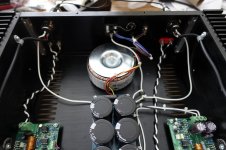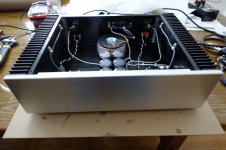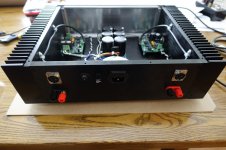IMO i think the most simplest way to protect your speakers if it happends that the chip sends dc to the speakers is just use an inline fuse correctly rated! simple elegant and effective....
Lawrence
Lawrence
The speaker line fuse has to be big enough to survive the transients.
That substantially increases the time required to blow the fuse when an incident occurs.
Part of the problem with fuses is the difference between "guaranteed not to blow" current rating and the "guaranteed to blow" current rating. This difference ratio can exceed ten times in some circumstances.
Then listeners have to ignore the added distortion of the variable resistor outside the NFB loop.
That substantially increases the time required to blow the fuse when an incident occurs.
Part of the problem with fuses is the difference between "guaranteed not to blow" current rating and the "guaranteed to blow" current rating. This difference ratio can exceed ten times in some circumstances.
Then listeners have to ignore the added distortion of the variable resistor outside the NFB loop.
what sort of unwanted event? Find me a failure case that I have not considered.
In the unlikely event of a failure of the feedback resistors or traces, in other words any break in the feedback circuit between the output and the power-ground will destroy your speaker.
Hi billshurv,
I remember i had to experiment a such event with a tweaked Behringer DCX2496 which freezed and sent a DC to my amplifier. So my two Altec 515-8G were immediately toasted.what sort of unwanted event?
In the unlikely event of a failure of the feedback resistors or traces, in other words any break in the feedback circuit between the output and the power-ground will destroy your speaker.
I can safely part that in the >10 years category.
I can safely part that in the >10 years category.
That does include today, tomorrow or next week.
Hi billshurv,
I remember i had to experiment a such event with a tweaked Behringer DCX2496 which freezed and sent a DC to my amplifier. So my two Altec 515-8G were immediately toasted.
If I used a behringer then I would know to AC couple its outputs. Not a fault mechanism I would leave to the power amp to deal with. FWIW you can ac couple the THAT1200 if you want. Maybe the guy who advocates line transformers for the DCX was onto something! I would also note that the LM3886 is likely to survive such an event.
That does include today, tomorrow or next week.
Not for me it doesn't. something that isn't powered up can't fail. Anyway as the protection circuit is more complex that the feedback loop that is more likely to fail first anyway.
A photo to show the project completed:
The more I listen to it and the more I find it is a wonderful small amplifier.
It is now replacing a Mark Levinson 29.
Dominique T
An externally hosted image should be here but it was not working when we last tested it.
The more I listen to it and the more I find it is a wonderful small amplifier.
It is now replacing a Mark Levinson 29.
Dominique T
The more I listen to it and the more I find it is a wonderful small amplifier.
It is now replacing a Mark Levinson 29.
Nice! That's a very nice compliment. Thanks.
~Tom
Good job Dominique, i like those wee alloy enclosures, i built My-Ref FE mono blocks using them.
I was thinking about using two of them when i can finally afford to build the Modulus 86, one for the PSU and the other for the amp boards. However if i do that, i might as well buy another power supply board and build mono blocks again.
If i can find a suitable larger enclosure at a reasonable price, that will probably decide it for me.
I was thinking about using two of them when i can finally afford to build the Modulus 86, one for the PSU and the other for the amp boards. However if i do that, i might as well buy another power supply board and build mono blocks again.
If i can find a suitable larger enclosure at a reasonable price, that will probably decide it for me.
Nice work! Is that chassis from one of the eBay sellers? Do you have the seller's name/ID handy?
~Tom
~Tom
This is the one I bought. BZ4312 Full Aluminum Enclosure Both Sides Heatsink Power Amplifier Box Chassis | eBay
Higher gain performance change(s)
If you do the substitution for 26db gain, r14 = 42.2K (IIRC), how much do the performance specs change?
If you do the substitution for 26db gain, r14 = 42.2K (IIRC), how much do the performance specs change?
If you do the substitution for 26db gain, r14 = 42.2K (IIRC), how much do the performance specs change?
At 6 dB higher gain, you'll get a reduction in PSRR, increase in THD, etc. of 6 dB.
~Tom
For the same output level? Even if you reduce the input to get the same test output?😕At 6 dB higher gain, you'll get a reduction in PSRR, increase in THD, etc. of 6 dB.
~Tom
- Home
- Amplifiers
- Chip Amps
- Modulus-86 build thread



